Unit 3 Could you please tell me where the restrooms are?
文档属性
| 名称 | Unit 3 Could you please tell me where the restrooms are? | 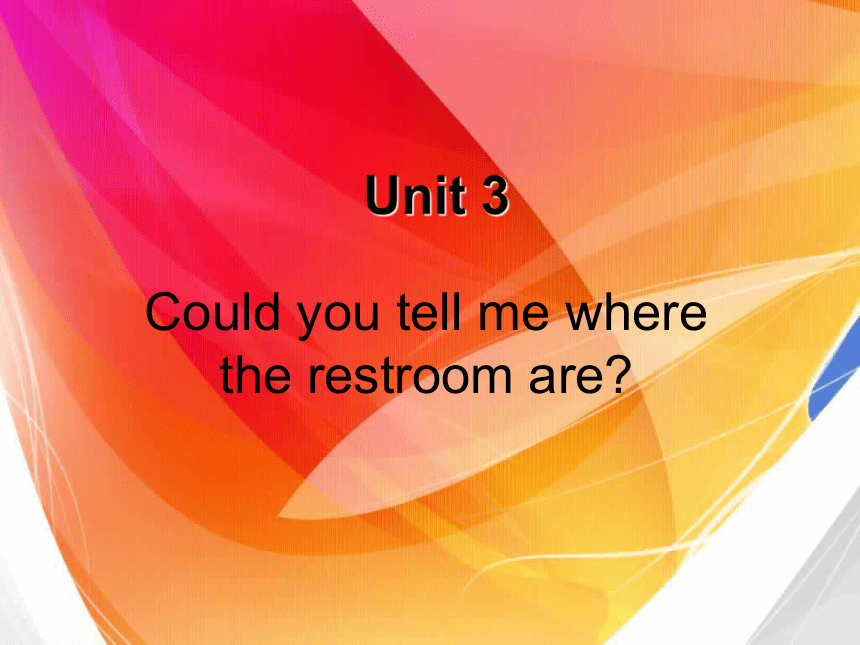 | |
| 格式 | zip | ||
| 文件大小 | 72.1KB | ||
| 资源类型 | 教案 | ||
| 版本资源 | 人教新目标(Go for it)版 | ||
| 科目 | 英语 | ||
| 更新时间 | 2014-08-01 18:10:48 | ||
图片预览

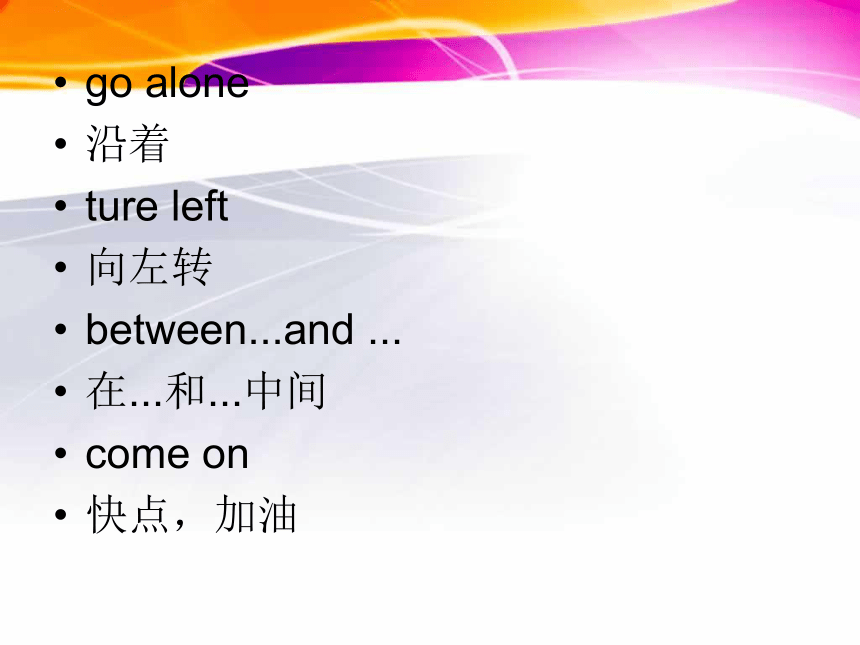
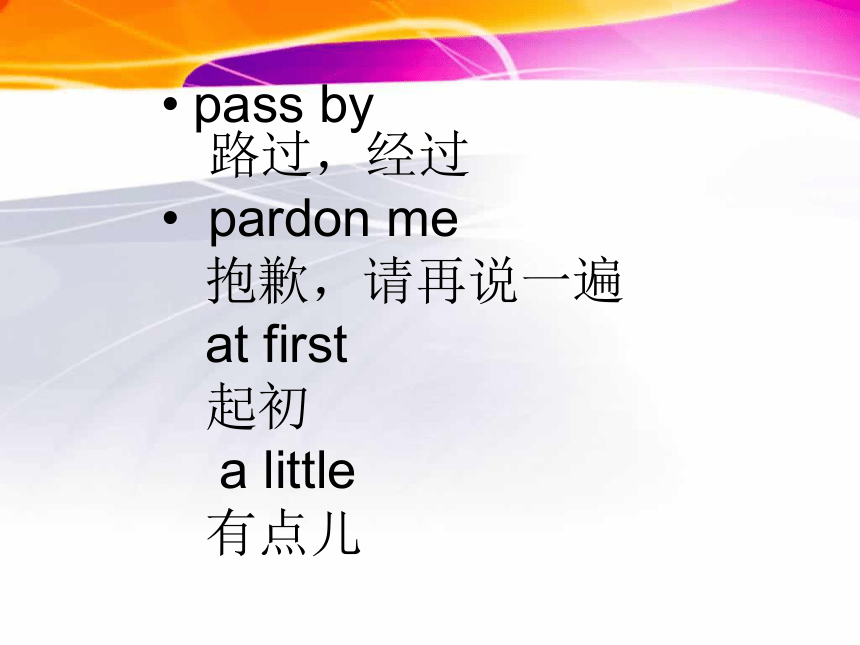
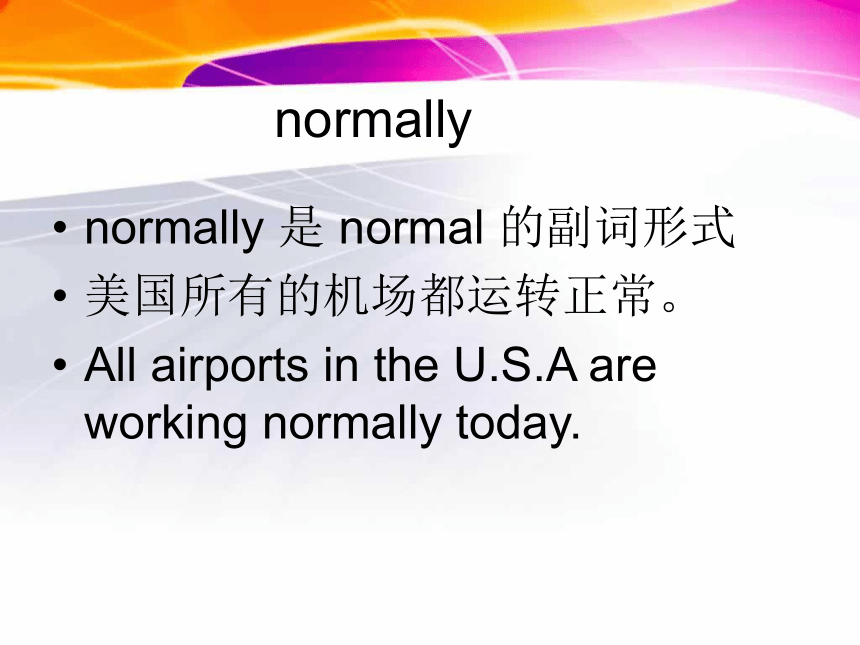
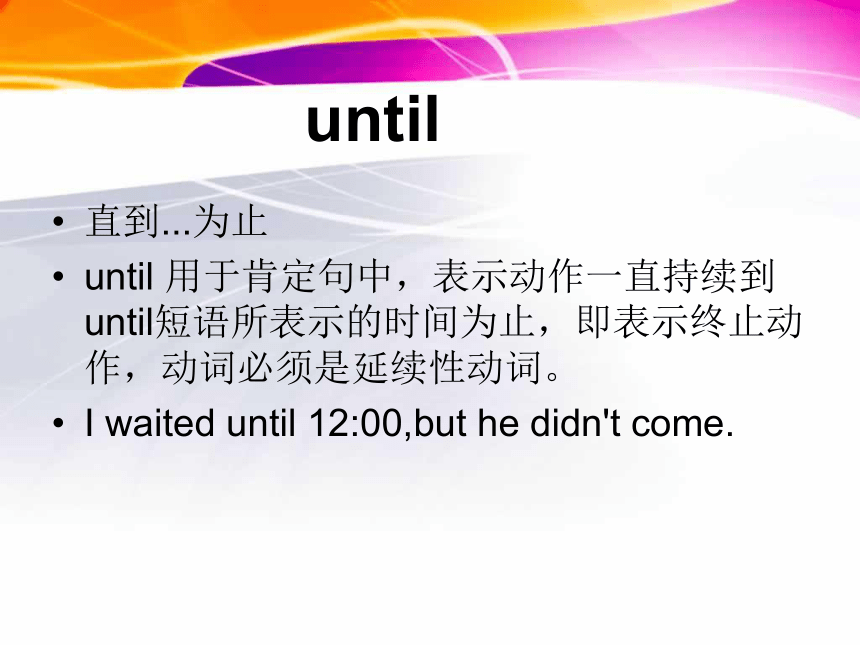
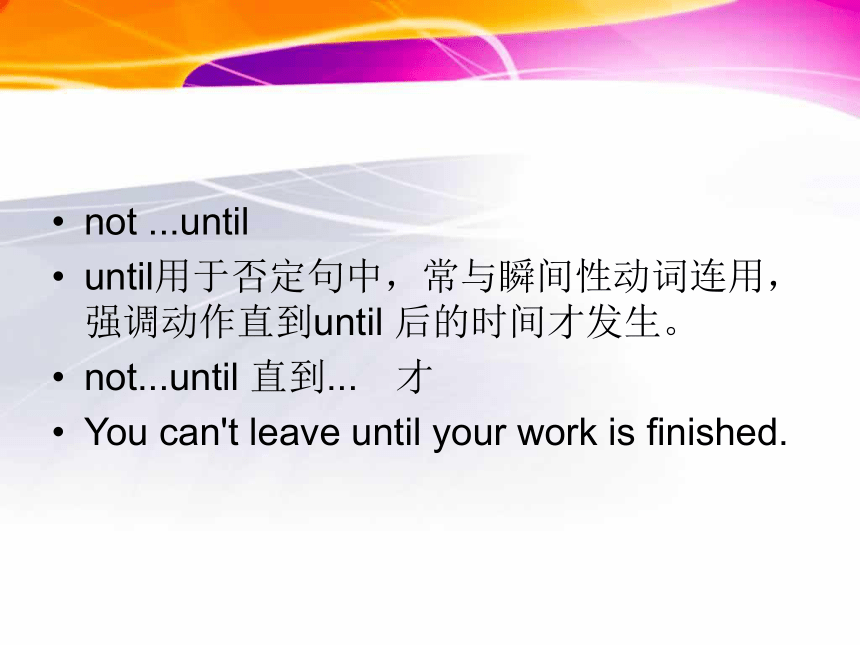
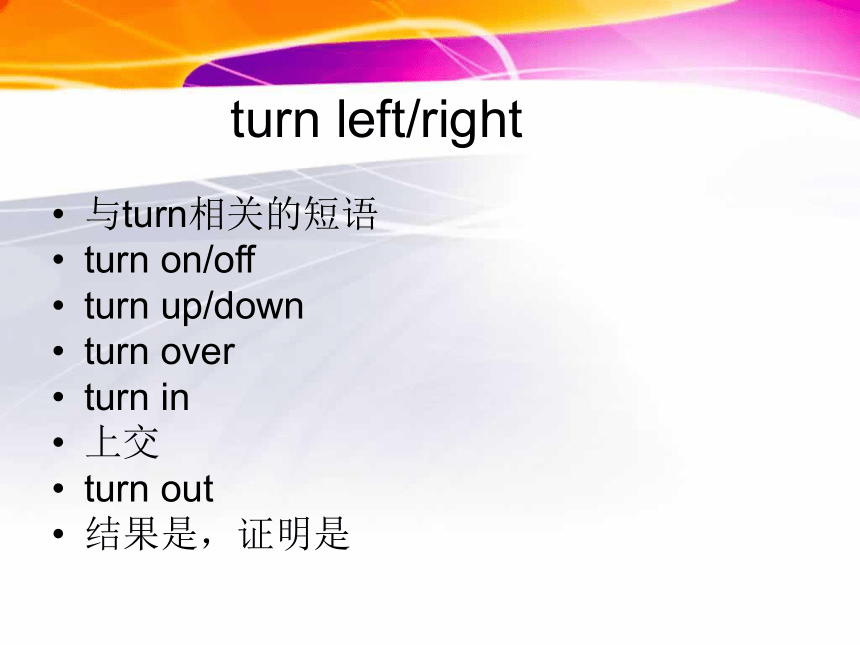
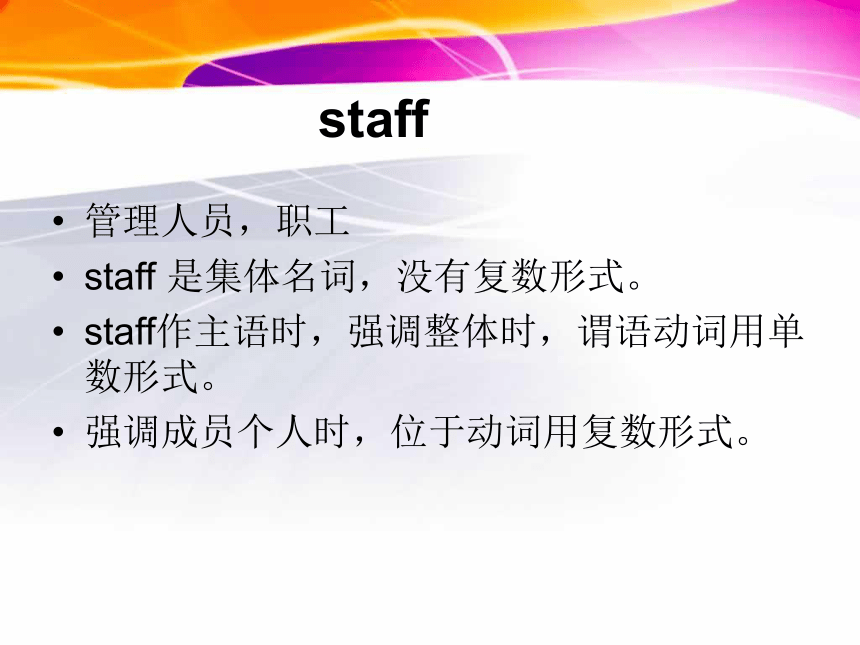
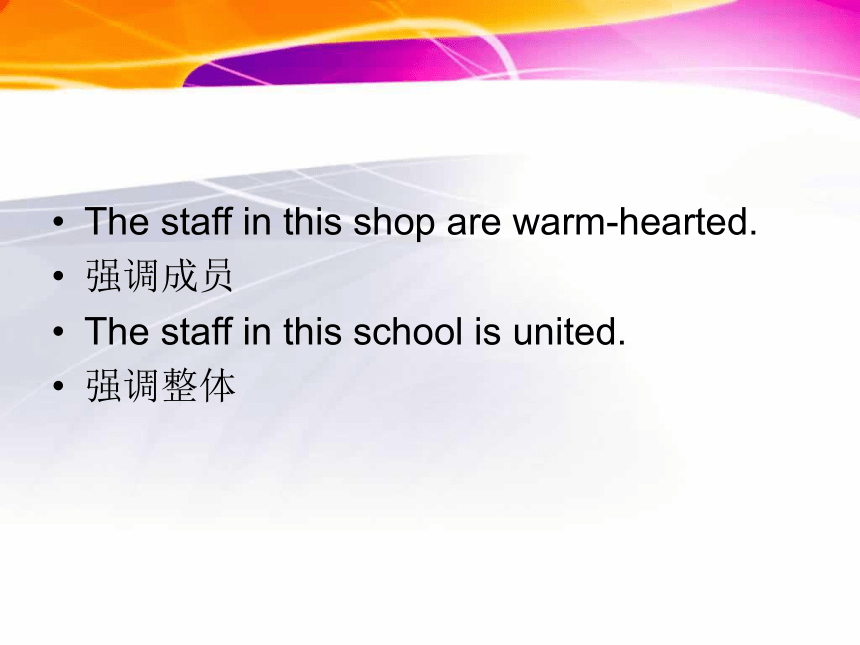
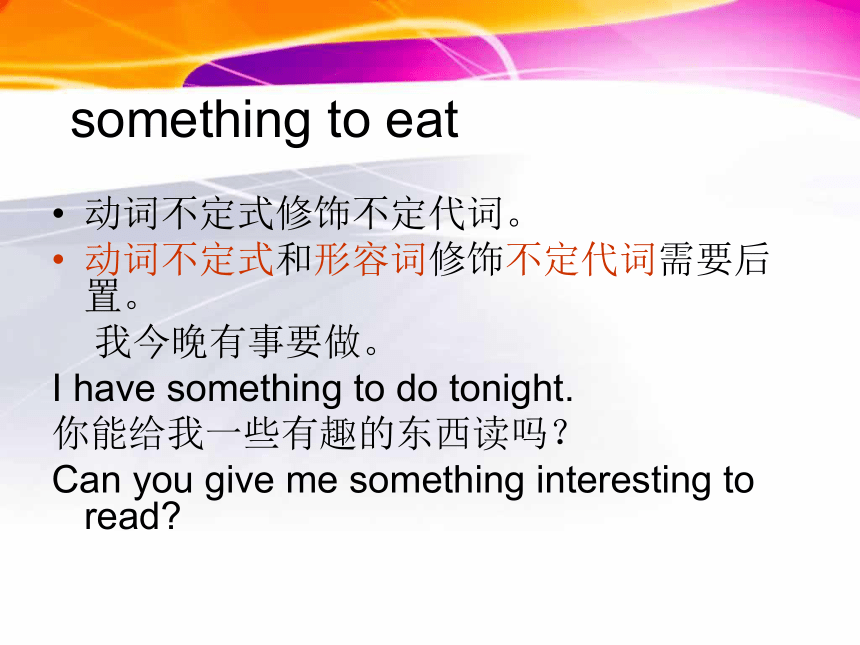

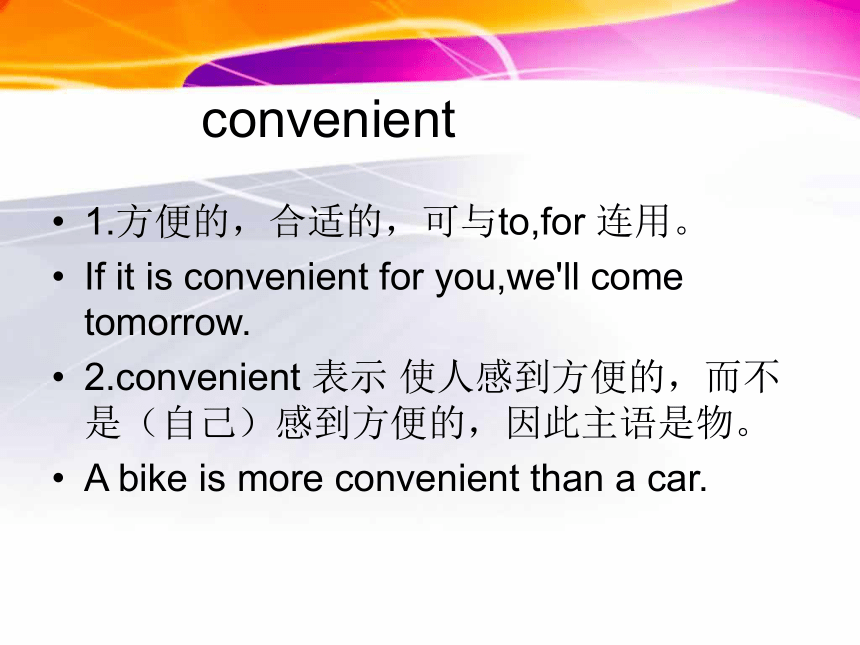
文档简介
课件30张PPT。Unit 3Could you tell me where the restroom are?go alone
沿着
ture left
向左转
between...and ...
在...和...中间
come on
快点,加油pass by 路过,经过
pardon me
抱歉,请再说一遍
at first
起初
a little
有点儿 normallynormally 是 normal 的副词形式
美国所有的机场都运转正常。
All airports in the U.S.A are working normally today. until直到...为止
until 用于肯定句中,表示动作一直持续到until短语所表示的时间为止,即表示终止动作,动词必须是延续性动词。
I waited until 12:00,but he didn't come.not ...until
until用于否定句中,常与瞬间性动词连用,强调动作直到until 后的时间才发生。
not...until 直到... 才
You can't leave until your work is finished. turn left/right与turn相关的短语
turn on/off
turn up/down
turn over
turn in
上交
turn out
结果是,证明是 staff 管理人员,职工
staff 是集体名词,没有复数形式。
staff作主语时,强调整体时,谓语动词用单数形式。
强调成员个人时,位于动词用复数形式。The staff in this shop are warm-hearted.
强调成员
The staff in this school is united.
强调整体 something to eat动词不定式修饰不定代词。
动词不定式和形容词修饰不定代词需要后置。
我今晚有事要做。
I have something to do tonight.
你能给我一些有趣的东西读吗?
Can you give me something interesting to read?
mail邮寄,发送电子邮件
mail sb at...
给某人发邮件到...
If you want,you can mail me at 55555@qq.com convenient1.方便的,合适的,可与to,for 连用。
If it is convenient for you,we'll come tomorrow.
2.convenient 表示 使人感到方便的,而不是(自己)感到方便的,因此主语是物。
A bike is more convenient than a car.be convenient
合适的,方便的。后常接介词for to引出相关短语。
Is it convenient to start work now? politely副词,礼貌地,客气地,它的形容词为:
polite
不礼貌的:impolitely rudely
Bob总是很有礼貌地对别人讲话。
Bob alwalys speaks to others politely.
否定前缀的用法in- im- un- dis-
correct incorrect
possible impossible
important unimportant
necessary unnecessary
agree disagree derection名词,方向,方位
常与介词in连用,意为“向着,朝着...”
in...derection
朝这个方向走
Go in this derection.both两个都;(用在实动之前,其它动词之后)
You are both too young.
They both speak English.
Both of …..+名词复数
如: Both of the flowers are beautiful. 两朵花都很漂亮。
both…and…两者都……
反义词组:
neither…nor…两者都不……
注意:
all:都(三者或三者以上);
either:两者中任一个;
every:每个(三者或三者以上)
in...situation处于...的形式,在...情况下
我在坏的情形下。
I've been in bad situation.
include包括,包含。(接名词,或动名词)
指在一个整体中包括了其中一部分内容或项目等,包含强调部分。
The price includes both house and furniture.
Your duties include putting the children to bed.
including 作介词,包括...在内
后跟 名词或者代词,在句中作状语,是对主句的补充说明,一般用逗号与主句隔开。
I like vegetables ,including cabbages. except & besidesexcept 除...之外(不再有)
指从整体中排除 except所带的人或物,前面常有all , every,any,no及其他复合词,但在否定句中,except 没有排斥性。
除了吉姆,所有的学生都去动物园了。
All the studnts went to the zoo except Jim.
besides 除....之外(还有)
它的意思是在原来的基础上加上besides 除外的人或物,其前常有other,another,any other , a few
除了你之外,我还有几个好朋友。
I have a few good friends besides you. any other任何其他的+名词单数,常用于比较级句型中。多用于同一范围内比较。
Lucy is more careful than any other student in her class. any other 常可与the other+可数名词的复数形式 或 the others 互换
相当于the rest 其余的
Lucy is more careful than the other students in her class.other+名词=others
别的...
Some boys are reading books,other boys=others are watching TV.
(还有可能一些在干别的) 花费take
It take sb.some time to do sth.
spend
Sb.spend time / money in doing sth(on sth)
pay
Sb.pay money for sth.
cost
Sth.costs sb money
could you please请你做某事好吗?比Can you please do sth?更礼貌,委婉。
肯定回答:
Sure/ of course/Certainly./No problem
否定回答:
Sorry,I can't. 宾语从句特殊疑问句变为宾语从句时,语序要变为陈述句语序,用连接代词或连接副词(即保留原来的疑问句)引导。
Who is he?
Do you know
What does he want?
I don't know
Where will he arrive?
He asked me who he is?what he want?Where he would arrive?
沿着
ture left
向左转
between...and ...
在...和...中间
come on
快点,加油pass by 路过,经过
pardon me
抱歉,请再说一遍
at first
起初
a little
有点儿 normallynormally 是 normal 的副词形式
美国所有的机场都运转正常。
All airports in the U.S.A are working normally today. until直到...为止
until 用于肯定句中,表示动作一直持续到until短语所表示的时间为止,即表示终止动作,动词必须是延续性动词。
I waited until 12:00,but he didn't come.not ...until
until用于否定句中,常与瞬间性动词连用,强调动作直到until 后的时间才发生。
not...until 直到... 才
You can't leave until your work is finished. turn left/right与turn相关的短语
turn on/off
turn up/down
turn over
turn in
上交
turn out
结果是,证明是 staff 管理人员,职工
staff 是集体名词,没有复数形式。
staff作主语时,强调整体时,谓语动词用单数形式。
强调成员个人时,位于动词用复数形式。The staff in this shop are warm-hearted.
强调成员
The staff in this school is united.
强调整体 something to eat动词不定式修饰不定代词。
动词不定式和形容词修饰不定代词需要后置。
我今晚有事要做。
I have something to do tonight.
你能给我一些有趣的东西读吗?
Can you give me something interesting to read?
mail邮寄,发送电子邮件
mail sb at...
给某人发邮件到...
If you want,you can mail me at 55555@qq.com convenient1.方便的,合适的,可与to,for 连用。
If it is convenient for you,we'll come tomorrow.
2.convenient 表示 使人感到方便的,而不是(自己)感到方便的,因此主语是物。
A bike is more convenient than a car.be convenient
合适的,方便的。后常接介词for to引出相关短语。
Is it convenient to start work now? politely副词,礼貌地,客气地,它的形容词为:
polite
不礼貌的:impolitely rudely
Bob总是很有礼貌地对别人讲话。
Bob alwalys speaks to others politely.
否定前缀的用法in- im- un- dis-
correct incorrect
possible impossible
important unimportant
necessary unnecessary
agree disagree derection名词,方向,方位
常与介词in连用,意为“向着,朝着...”
in...derection
朝这个方向走
Go in this derection.both两个都;(用在实动之前,其它动词之后)
You are both too young.
They both speak English.
Both of …..+名词复数
如: Both of the flowers are beautiful. 两朵花都很漂亮。
both…and…两者都……
反义词组:
neither…nor…两者都不……
注意:
all:都(三者或三者以上);
either:两者中任一个;
every:每个(三者或三者以上)
in...situation处于...的形式,在...情况下
我在坏的情形下。
I've been in bad situation.
include包括,包含。(接名词,或动名词)
指在一个整体中包括了其中一部分内容或项目等,包含强调部分。
The price includes both house and furniture.
Your duties include putting the children to bed.
including 作介词,包括...在内
后跟 名词或者代词,在句中作状语,是对主句的补充说明,一般用逗号与主句隔开。
I like vegetables ,including cabbages. except & besidesexcept 除...之外(不再有)
指从整体中排除 except所带的人或物,前面常有all , every,any,no及其他复合词,但在否定句中,except 没有排斥性。
除了吉姆,所有的学生都去动物园了。
All the studnts went to the zoo except Jim.
besides 除....之外(还有)
它的意思是在原来的基础上加上besides 除外的人或物,其前常有other,another,any other , a few
除了你之外,我还有几个好朋友。
I have a few good friends besides you. any other任何其他的+名词单数,常用于比较级句型中。多用于同一范围内比较。
Lucy is more careful than any other student in her class. any other 常可与the other+可数名词的复数形式 或 the others 互换
相当于the rest 其余的
Lucy is more careful than the other students in her class.other+名词=others
别的...
Some boys are reading books,other boys=others are watching TV.
(还有可能一些在干别的) 花费take
It take sb.some time to do sth.
spend
Sb.spend time / money in doing sth(on sth)
pay
Sb.pay money for sth.
cost
Sth.costs sb money
could you please请你做某事好吗?比Can you please do sth?更礼貌,委婉。
肯定回答:
Sure/ of course/Certainly./No problem
否定回答:
Sorry,I can't. 宾语从句特殊疑问句变为宾语从句时,语序要变为陈述句语序,用连接代词或连接副词(即保留原来的疑问句)引导。
Who is he?
Do you know
What does he want?
I don't know
Where will he arrive?
He asked me who he is?what he want?Where he would arrive?
同课章节目录
- Unit 1 How can we become good learners.
- Section A
- Section B
- Unit 2 I think that mooncakes are delicious!
- Section A
- Section B
- Unit 3 Could you please tell me where the restroom
- Section A
- Section B
- Unit 4 I used to be afraid of the dark.
- Section A
- Section B
- Unit 5 What are the shirts made of?
- Section A
- Section B
- Review of Units 1-5
- Unit 6 When was it invented?
- Section A
- Section B
- Unit 7 Teenagers should be allowed to choose their
- Section A
- Section B
- Unit 8 It must belong to Carla.
- Section A
- Section B
- Unit 9 I like music that I can dance to.
- Section A
- Section B
- Unit 10 You're supposed to shake hands.
- Section A
- Section B
- Review of Units 6-10
- Unit 11 Sad movies make me cry.
- Section A
- Section B
- Unit 12 Life is full of the unexpected
- Section A
- Section B
- Unit 13 We're trying to save the earth!
- Section A
- Section B
- Unit 14 I remember meeting all of you in Grade 7.
- Section A
- Section B
- Review of Units 11-14
